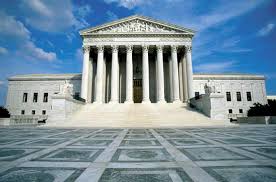Supreme Court: Police Need Warrants to Search Cellphone Data
< < Go Back
Unanimous Supreme Court Says Privacy Interests Outweigh Police Convenience.
A unanimous Supreme Court ruled Wednesday that police must obtain a warrant to search the vast amount of information on a suspect’s cellphone, broadly protecting Americans’ privacy rights in the digital age.
The opinion, by Chief Justice John Roberts, dismissed law-enforcement arguments that no legal distinction existed between smartphones and the pocket litter that police long have been permitted to search when arresting a suspect—for instance, wallets, cigarette wrappers and address books.
“That is like saying a ride on horseback is materially indistinguishable from a flight to the moon,” Chief Justice Roberts wrote. “Modern cell phones, as a category, implicate privacy concerns far beyond those implicated by the search of a cigarette pack, a wallet or a purse,” he wrote.
Warrantless searches have been justified by the need to protect officers from hidden weapons and to prevent suspects from destroying evidence. Neither rationale applied to the digital data accessible through a cellphone or other mobile devices, the court found, in erecting a requirement that police go to court before rifling through email, text messages, phone records or other data.
The chief justice acknowledged that mobile devices are essential tools for today’s criminals, as they are for most Americans, and that requiring police to seek a magistrate’s permission to search them could impede some investigations.
But individual rights sometimes outweigh the convenience of government, he wrote, adding: “Privacy comes at a cost.”
The decision, which built on several privacy rulings in recent years, was one of a pair Wednesday in which the high court forcefully applied age-old doctrines to a society rapidly being transformed by new technology. The warrant ruling, in particular, could have consequences for privacy questions that are likely to arise as technology advances.
The second decision involved online video technology by Aereo Inc., which was challenged by traditional broadcasters arguing it violated their copyrights. In Aereo, the court effectively said the company couldn’t use technology workarounds to escape copyright restrictions for a service that captured broadcasting signals, recorded them and distributed someone else’s content over the Web.
Privacy advocates hailed the cellphone ruling as a signal that the court would protect constitutional privacy interests from the vast powers of modern technology. “By recognizing that the digital revolution has transformed our expectations of privacy, today’s decision is itself revolutionary and will help to protect the privacy rights of all Americans,” said Steven Shapiro, legal director of the American Civil Liberties Union.
Law-enforcement officials were disappointed. Technology “is making it easier and easier for criminals to do their trade,” while the court “is making it harder for law enforcement to do theirs,” said Thomas Zugibe, district attorney in Rockland County, N.Y., who signed a friend-of-the-court brief arguing warrantless device searches were constitutional.
More From The Wall Street Journal (subscription required):




